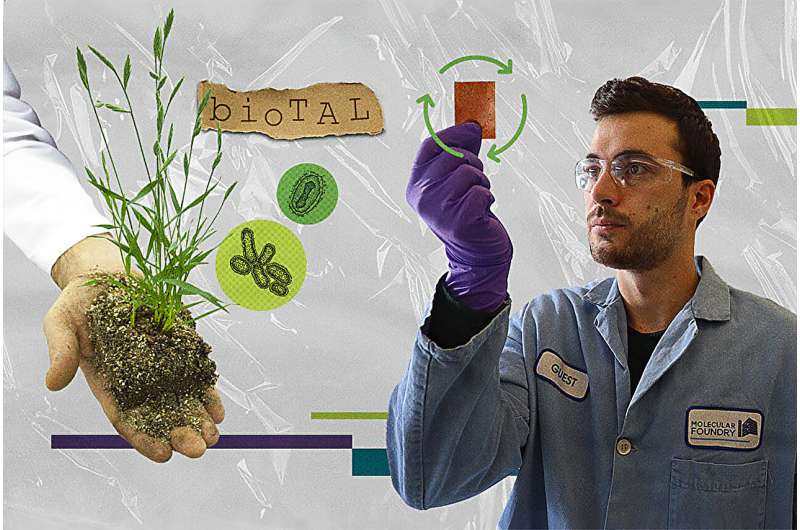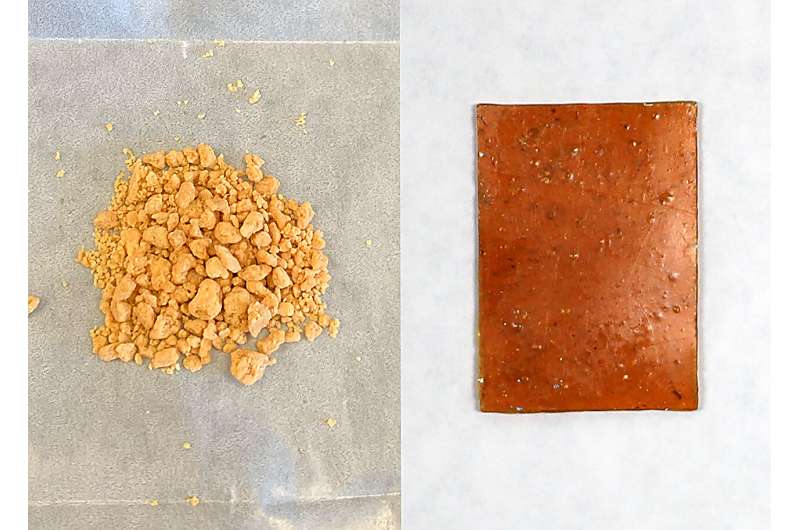
Plastic waste is a problem. Most plastics can’t be recycled, and many use finite, polluting petrochemicals as the basic ingredients. But that’s changing. In a study published in Nature Sustainability, researchers successfully engineered microbes to make biological alternatives for the starting ingredients in an infinitely recyclable plastic known as poly(diketoenamine), or PDK.
The finding comes from collaboration among experts at three facilities at the Department of Energy’s Lawrence Berkeley National Laboratory (Berkeley Lab): the Molecular Foundry, the Joint BioEnergy Institute (JBEI), and the Advanced Light Source.
“This is the first time that bioproducts have been integrated to make a PDK that is predominantly bio-based,” said Brett Helms, staff scientist at the Molecular Foundry who led the project. “And it’s the first time that you see a bio-advantage over using petrochemicals, both with respect to the material’s properties and the cost of producing it at scale.”
Unlike traditional plastics, PDK can be repeatedly deconstructed into pristine building blocks and formed into new products with no loss in quality. PDKs initially used building blocks derived from petrochemicals, but those ingredients can be redesigned and produced with microbes instead.
Now, after four years of effort, collaborators have manipulated E. coli to turn sugars from plants into some of the starting materials—a molecule known as triacetic acid lactone, or bioTAL—and produced a PDK with roughly 80% bio-content.
“We’ve demonstrated that the pathway to 100% bio-content in recyclable plastics is feasible,” said Jeremy Demarteau, a project scientist on the team contributing to biopolymer development. “You’ll see that from us in the future.”
PDKs can be used for a variety of products, including adhesives, flexible items like computer cables or watch bands, building materials, and “tough thermosets,” rigid plastics made through a curing process. Researchers were surprised to find that incorporating the bioTAL into the material expanded its working temperature range by up to 60° Celsius compared to the petrochemical version. This opens the door to using PDKs in items that need specific working temperatures, including sports gear and automotive parts such as bumpers or dashboards.
Solving the plastic waste problem
The United Nations Environment Program estimates that we globally produce about 400 million tons of plastic waste every year, and that number is predicted to climb to more than 1 billion tons by 2050. Of the 7 billion tons of plastic waste already created, only about 10% has been recycled, while most is discarded into landfills or burned.

“We can’t keep using our dwindling supply of fossil fuels to feed this insatiable desire for plastics,” said Jay Keasling, a professor at UC Berkeley, senior faculty scientist in Berkeley Lab’s Biosciences Area, and the CEO of JBEI. “We want to help solve the plastic waste problem by creating materials that are both biorenewable and circular—and providing an incentive for companies to use them. Then people could have the products they need for the time they need them, before those items are transformed into something new.”
The study also builds on a 2021 environmental and technological analysis, which showed that PDK plastic could be commercially competitive with conventional plastics if produced at a large scale.
“Our new results are extremely encouraging,” said Corinne Scown, a staff scientist in Berkeley Lab’s Energy Technologies Area and a vice president at JBEI. “We found that with even modest improvements to the production process, we could soon be making bio-based PDK plastics that are both cheaper and emit less CO2 than those made with fossil fuels.”
Those improvements would include speeding up the rate at which microbes convert sugars to bioTAL, using bacteria that can transform a wider variety of plant-derived sugars and other compounds, and powering the facility with renewable energy.
More information:
Biorenewable circularity in polydiketoenamine plastics, Nature Sustainability (2023). DOI: 10.1038/s41893-023-01160-2 , www.nature.com/articles/s41893-023-01160-2
Provided by
Lawrence Berkeley National Laboratory
Citation:
Making renewable, infinitely recyclable plastics using bacteria (2023, July 27)
retrieved 27 July 2023
from https://phys.org/news/2023-07-renewable-infinitely-recyclable-plastics-bacteria.html
This document is subject to copyright. Apart from any fair dealing for the purpose of private study or research, no
part may be reproduced without the written permission. The content is provided for information purposes only.










